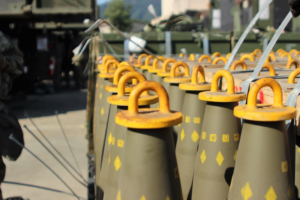
As the Biden administration reportedly nears a decision on providing cluster munitions to Ukraine, the Pentagon said Thursday any such weapons under consideration would be newer variants with dud rates below 2.35 percent. Providing such dual-purpose improved conventional munitions (DPICM) with a dud rate above one percent, which accounts for the average percentage of bomblets in the weapon that fail to explode, would require a waiver to bypass existing congressional restrictions. “I will say that we have multiple variants of…

 By
By 










